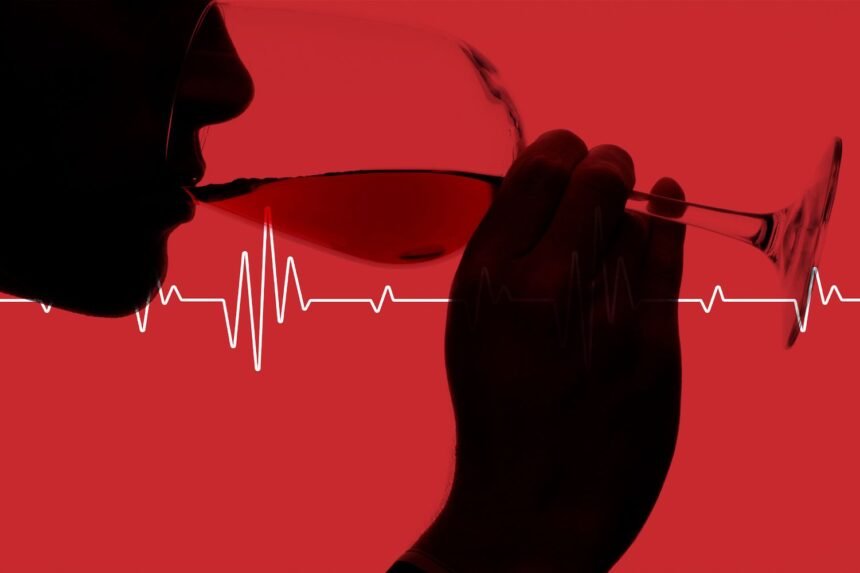As we gear up to welcome the new year, let’s pause for a moment and think about what we’re truly celebrating. Sure, the Earth has completed another lap around the Sun, but is that worth putting your heart at risk? Overindulging in alcohol may feel festive, but it’s important to remember that alcohol is not your heart’s best friend.
Doctors universally agree that alcohol isn’t something they’d ever recommend for good health. However, if you do choose to drink, it’s crucial to know your limits. For men, this means sticking to no more than two drinks (each drink equaling about 30 ml, or 60 ml of hard liquor in total, which is roughly 24 grams of alcohol). Women, on the other hand, should limit themselves to just one drink. Anything beyond these amounts falls into the category of binge-drinking, which can be harmful to your heart.
Excessive alcohol intake is toxic to the heart muscle and can disrupt the heart’s conduction system — the electrical signals that keep your heart beating in rhythm. Over time, this can lead to serious heart issues, even if you don’t feel the effects right away.
So, as you celebrate New Year’s Eve, keep your heart in mind. Enjoy the festivities, but know that moderation is key. After all, there’s nothing more important than starting the new year with a healthy heart.
Take care, drink responsibly, and have a wonderful New Year!
Can occasional binge drinking put your heart at risk?
If your body isn’t accustomed to alcohol, a night of heavy drinking can have unexpected consequences. Research on 200 partygoers who consumed several drinks revealed a concerning trend: many experienced irregular heartbeats, known as cardiac arrhythmias, within 48 hours.
For someone with an otherwise healthy heart, these irregular rhythms can cause serious issues. The heart’s electrical system may struggle to function properly, potentially leading to a sudden cardiac arrest (SCA) — a condition where the heart abruptly stops beating.
It’s a stark reminder that even one night of binge drinking can have serious effects, especially for those who don’t usually consume alcohol. If you’re planning a night out, it’s worth keeping this in mind and being mindful of your limits to protect your heart.
Alcohol is one of the most toxic substances for your cells, and excessive consumption can cause significant harm to your heart muscle. When alcohol levels spike in your body, the upper chambers of your heart (the atria) struggle to pump blood properly into the lower chambers (the ventricles). Instead of the normal 60 to 100 signals per minute, the ventricles may receive an overwhelming 140 to 160 signals. This miscommunication can lead to blood pooling and clotting in the heart. If a blood clot breaks loose and makes its way to the brain, it can block blood flow and lead to a stroke.
Additionally, when your heart can’t pump enough oxygenated blood to meet your body’s needs, it can result in heart failure. Overindulging in alcohol, even for just one night, can stretch, enlarge, and weaken the heart. This condition, known as alcohol-induced cardiomyopathy, prevents the heart from working as efficiently as it should, reducing the oxygen supply your body depends on.
While anyone who drinks too much alcohol is at risk, this condition is more common in individuals with alcohol use disorders or certain genetic traits that slow down alcohol processing in the body. Research also suggests that repeated episodes of binge drinking can increase the likelihood of developing alcohol-related heart problems, even for those without a history of heavy drinking.
Keeping your alcohol consumption in check is not just about avoiding a hangover — it’s about protecting your heart and overall health.
Understanding Symptoms and Their Solutions
If your heart is under strain from excessive alcohol, you might notice symptoms like shortness of breath, fatigue, a racing heartbeat, dizziness, swelling (edema), or even persistent coughing. The good news is that in many cases, stepping away from alcohol can significantly help your heart recover.
Even reducing your alcohol consumption to light or moderate levels can make a noticeable difference in your health. However, it’s important not to push your body to its limits again. Giving your heart and body the care they need means making sustainable changes and being mindful of your overall well-being.
What to Do and What to Avoid
If you choose to drink, it’s important to do so mindfully, especially if you’re at risk for heart problems. For those with high-risk factors, the safest option is to avoid alcohol altogether.
If you do drink, take it slow and savor the moments with friends rather than focusing on the drinks. Starting with a mocktail can be a great way to pace yourself, and staying hydrated throughout the evening will help maintain your body’s electrolyte balance, which is essential for keeping your heart’s electrical signals stable. Always pair your drinks with food to reduce the impact on your system.
The next day, skip your gym session and give your body the rest it needs. Alcohol can raise your heart rate, and combining it with intense physical activity can place unnecessary strain on your heart. Prioritizing recovery and practicing moderation will go a long way in protecting your health. A little discipline can make a big difference!










